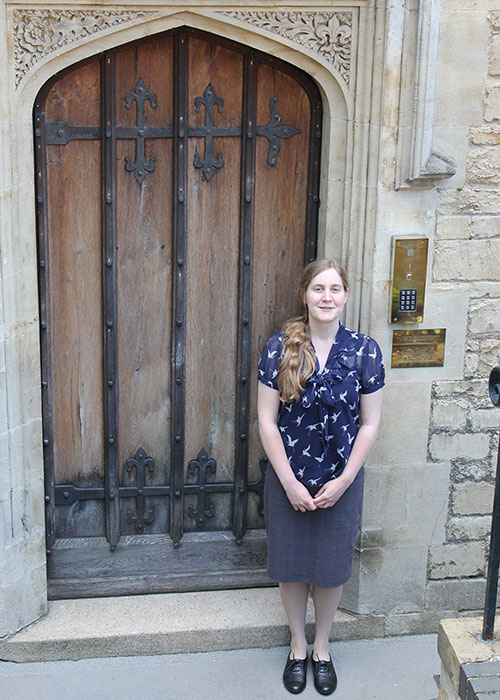Being chosen for The National Archives’ Transforming Archives traineeship position at the St George’s Chapel Archives at Windsor Castle is the best thing that has happened to me.
This traineeship offered the opportunity to learn traditional archiving skills including Latin and palaeography (how to read old handwriting styles) as well as other skills required to work in an archive. Ancient history and language are things which particularly interest me and, having previously learnt ancient Greek, I was eager to have a go at learning Latin. Plus, not many people have the chance to say they work at a castle!
I stumbled upon the traineeship by chance. Having taken a year out of work to focus on an undergraduate degree and feeling a little despondent trawling through the usual job websites, I asked myself: If I could work anywhere, what would be the dream job? The answer took me to The National Archives website to research what it would take to start a career in archiving and the rest, as they say, is history.
It is now nine months since I first set foot into an archive and I feel as though I have learnt so much; from the day-to-day aspects of working in an archive and cataloguing, through to creating outreach opportunities.
The St George’s Chapel archive and library collection covers a period of over 800 years and contains rare books, ecclesiastical and manorial documents, architectural plans and designs, pictures, photographs, music manuscripts, wax seals, and much more, including locks of kings’ hair! The variety within the archive has provided a fantastic opportunity to learn how to work with and use a large range of items.
I have been involved in researching and designing an exhibition on King George III and the restoration of St George’s Chapel. The exhibition showcases some of the archive’s collection and is now on display in the Chapel to be seen by over a million visitors to the castle each year.
I have guided visitors both within the archive and around the Chapel and have thoroughly enjoyed learning about this prestigious site and the College of St George. It is great to be able to share and promote my knowledge of the collection with others, and feels particularly rewarding when assisting with family history enquiries.
Often the best part of working in an archive is what you discover in the course of working on something else! My first taster of this came with my first task as a trainee to create a description of the printed music in the collection. A seemingly unassuming music book was found to have been turned into a scrap book of letters and memoranda relating to the performance of choral songs in honour of Queen Victoria. One such letter was written by the celebrated British composer Edward Elgar and was set alongside the piece of music he composed for the occasion. I turned my find into a blog which sparked further outside interest in the letter and the book. I will remember that find for the rest of my life and the fact that it confirmed my love of archives!
![Some of the account rolls used in the transcription and translation project. The open account roll dates from 1366-1367 [SGC XV.34.4]. Copyright of the Dean and Canons of Windsor. Used by permission](https://cdn.nationalarchives.gov.uk/blog/wp-content/uploads/2015/07/01155613/account-rolls.jpg)
Some of the account rolls used in the transcription and translation project. The open account roll dates from 1366-1367 [SGC XV.34.4]. Copyright of the Dean and Canons of Windsor. Used by permission
I had never seen or handled such old documents before and so to be able to work with them has been incredible! Through studying palaeography, I have learnt the techniques to successfully read the various handwriting styles from the 14th century up to the present (and I can say without doubt that Victorian handwriting is the worst!). Learning Latin through a combination of self and guided study and a module with the University of Dundee has been a thoroughly rewarding and enjoyable experience. The account rolls project has been a great proving ground for my newly acquired skills as well as helping to ensure these precious documents are available for generations to come.
In addition to great experiences within the archive, the traineeship has given me access to opportunities outside of my placement. I have been able to become a student member of the Archives and Records Association (ARA) professional body and I am looking forward to attending their annual conference in Dublin in August. I am also currently involved in writing an article with two other Transforming Archives trainees for the ARA’s magazine.
This traineeship has opened up the world of archiving for me, both as a great sector to work in and as treasure troves of information. I hope to continue to work in the archiving sector after the traineeship ends and take part in other projects based on medieval documents.

Dear Gemma,
What a marvellous job and how useful to have the chapel archives being transcribed.
I believe the Victorians opened most of the royal coffins at Windsor.
As a historical novelist with several books set in the Wars of the Roses, I would love to know the hair colour of King Edward IV’s, Queen Elizabeth Woodville’s and Lord Hastings, as they have been among my main characters. I guess the colour may have changed with time but I guess there must have been a description in the archives, too.
Would love to hear from you if you have a moment.
Kindest wishes,
Isolde Martyn